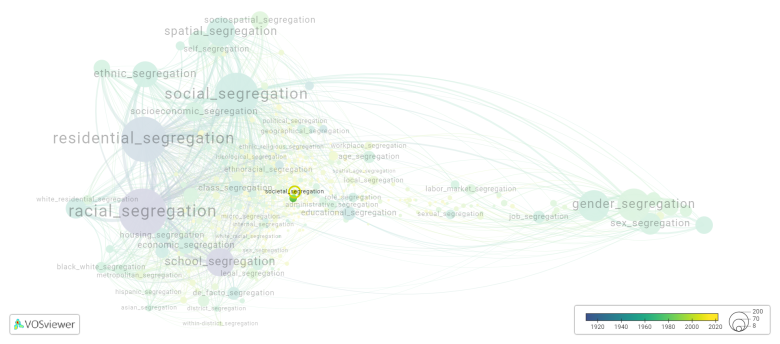Societal segregation
Date and country of first publication[1]
2016
Germany; Switzerland
Definition
Societal segregation refers to the separation or division of different groups within a society based on factors such as race, ethnicity, socio-economic status, religion, or other characteristics. This segregation can manifest in various ways, including residential segregation, educational segregation, and economic segregation. It can result in unequal access to resources, opportunities, and social networks, leading to disparities in quality of life and perpetuating social inequality. Efforts to address societal segregation often involve promoting diversity, inclusion, and equal access to opportunities for all members of society.
See also
Related segregation forms
Societal segregation is frequently discussed in the literature with the following segregation forms:
cultural segregation, residential segregation

This visualization is based on the study The Multidisciplinary Landscape of Segregation Research.
For the complete network of interrelated segregation forms, please refer to:
References
Notes
- ↑ Date and country of first publication as informed by the Scopus database (December 2023).
Societal segregation appears in the following literature
Titzmann P.F., Serwata O.J., Silbereisen R.K., Davidov E. (2016). A Comparative Perspective on Mothers’ Ethnic Homophily Among Minority Groups in Germany and Israel. Journal of Cross-Cultural Psychology, 47(8), 1076-1096. SAGE Publications Inc..https://doi.org/10.1177/0022022116658245
L’nyavskiy-Ekelund S., Siiner M. (2017). Fostering social inclusion through multilingual habitus in estonia: A case study of the open school of Kalamaja and the Sakala private school. Social Inclusion, 5(4), 98-107. Cogitatio Press.https://doi.org/10.17645/si.v5i4.1149
Taeuber K.E., Taeuber A.F. (2017). Residential segregation and neighborhood change. Residential Segregation and Neighborhood Change, 1-304. Taylor and Francis.https://doi.org/10.4324/9781315128535
Bräuchler B. (2018). Diverging ecologies on bali. Sojourn, 33(2), 362-396. Institute of Southeast Asian Studies.https://doi.org/10.1355/sj33-2f
Heckmann O. (2022). Future Urban Habitation: Transdisciplinary Perspectives, Conceptions, and Designs. Future Urban Habitation: Transdisciplinary Perspectives, Conceptions, and Designs, 1-452. wiley.https://doi.org/10.1002/9781119734895
Mangrio E., Strange M. (2022). Segregation within Welfare Societies Communication Barriers to Migrants’ Healthcare in Scandinavia. Global Health Communication for Immigrants and Refugees: Cases, Theories, and Strategies, 112-125. Taylor and Francis.https://doi.org/10.4324/9781003230243-8
Lengyel J., Roux S., Alvanides S. (2022). Multivariate analysis of socioeconomic profiles in the Ruhr area, Germany. Journal of Maps, 18(3), 576-584. Taylor and Francis Ltd..https://doi.org/10.1080/17445647.2022.2098839
